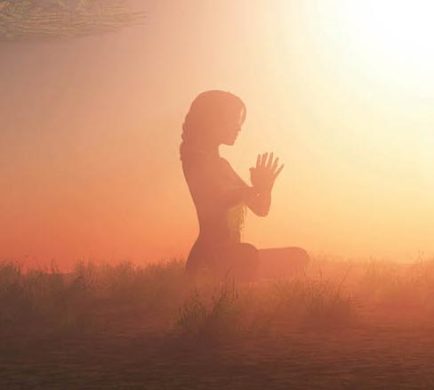In Buddhism, faith refers to a serene commitment to the practice of the Buddha’s teaching and trust in enlightened for, highly developed beings. Faith also may not only be devotion to a person but can exist in relation to concepts like karma and the possibility of enlightenment—an awakening to the true nature of reality.
Faith in early Buddhism focused on teaching and seeking wisdom and enlightenment. A faithful devotee was called an upāsaka or upāsika, a status for which no formal initiation was required. As important as faith was, it was merely a first step on the path to this wisdom and enlightenment. In the later years in Buddhist history, faith was given a much more important role.
In Pali, the language of the original Buddhist texts, the word for faith is saddha. While sometimes translated as “confidence” or “trust,” the literal meaning of saddha is “to place your heart upon.” According to the Pali, when we give our hearts over to a spiritual practice, it is a sign of faith or confidence in the practice of faith.
Practicing faith opens us up to concepts beyond our usual, limited, self-centered concerns. In Buddhist psychology, it is considered the gateway to all good things because faith sparks our initial inspiration to practice meditation, a practice of mindfulness.
In Buddhism, faith does not have God as the object or the foundation of trust. In this type of practice, faith does not require a belief in a personal God, as in Christianity. Faith, as trust, is not self-generated but arises out of the circumstances of one’s life—a sort of awakening to the faith of one’s spirit. Trust is the experience of the whole person and arises naturally as the true nature of human existence, we all depend on family, community, and nature, which support and enable our life process.
Faith can be considered as trust such as when a child trusts a father to catch them when they jump. Or, we trust the sun to rise each day. We trust the order of things which enables our life activities. Trust requires more than a belief in a particular fact, because one’s life may depend on our trust—it calls upon more from us and is more essential for living.
Faith involves a transformation of our approach to life and an awareness of the truth in our lives. Faith awakens us to our deep obligation in life, while energizing our commitment to the welfare of others. Faith, even when the root is different, is more holistic, involving the whole person.
Faith is also the awareness that we are part of a larger order of things, which, together, works to uplifting and fulfilling all beings here on our planet. Through such awareness of faith, we are able to live with compassion towards all beings and all living things.
The opposite of faith is doubt. There are many sides to doubt. There is a kind of doubt that is very positive. It is an edge of investigation that says, “I’m not going to accept this just because somebody else says it’s so. I really want to know these things more truthfully by my own investigations.”
Faith has the quality of allowing us to open, to draw near, and to go forth and harness our energy to pursue a goal or an aspiration. But faith has to be carefully balanced with wisdom. If we have too much faith without enough wisdom, then it becomes what we ordinarily call “blind faith.”
Faith is a spiritual force, but it is not an isolated spiritual force. That means faith was never meant to work by itself. It must work in conjunction with other spiritual forces. That’s the way faith is. It’s not an isolated force that operates alone. Faith functions in harmony with the other spiritual forces that are set into motion, such as love, hope, patience, and prayer.
We recognize this basic striving as “faith,” and it is a universal part of being human. Even atheists have this kind of faith. Often, we hear that “faith is a gift,” and everyone has the gift of faith—that innate drive to seek meaning, purpose, and significance. Some people exercise this innate gift more than others, allowing their faith to be better defined than others who don’t use their gift.
No matter what religion or what “faith” is in play for each of us, we must strive to “place our heart upon” something of meaning, something that is true to us, or something we believe in. The meaning of faith can vary for each individual, depending on what we put our hearts upon or the quality with which we give our hearts. We must take a step back from our conditioning, from our past, and from our belief systems and then step forward to take a profound look within ourselves in order to allow the truth to speak to us in order to present whatever might be revealed through our own experiences. Be willing to be open, be willing to explore, be willing to investigate. Work with the systems that are true to you and have faith.
In order to deepen our faith, we have to be able to try things out, to wonder, to doubt. In fact, faith is strengthened by doubt when doubt is sincere, critical questioning combined with deep trust in our own right and ability to discern the truth. In Buddhism, this kind of questioning is known as skillful doubt. For doubt to be skillful, we have to be close enough to an issue to care about it yet open enough to let questioning come alive.
For faith to be alive and to deepen, we need to use our power to inquire, to wonder, and to explore a truth intensely for ourselves. This requires us to approach the practice with an inquisitive, eager, self-confident capacity to probe and question. It requires us to examine where we place our faith and why to see if it makes us more aware and loving people. To develop faith, we need to be open to the messiness, the discordance, the ambivalence, and, above all, the vital life force of questioning things that cross our paths. If we don’t, our faith can wither. If we don’t, our faith will always remain in the hands of someone else, as something we borrow, but not as something we can claim fully as our own.
The process of interaction between faiths is more than a question of religious beliefs, concepts, or words. It also involves culture. Within each religious tradition, an understanding of life, values, and social relations has developed over centuries. In the United States, because of social and religious freedom, varying styles of life are now penetrating the host culture as never before.
Faith involves a transformation of one’s approach to life and one’s awareness of the truth for one’s life. Faith awakens us to our deep obligation to life, while energizing our commitment to the welfare of others as the foundation for living. Faith, even when the root is different, is more holistic, involving the whole person, while belief is simply mental assent to the factuality or accuracy of a given proposition.
When we explore the meaning of faith in Christianity and Buddhism, we discover that they both speak to the whole person in order to arouse commitment to promote the welfare of all beings. At the same time, they reflect differing understandings of the basis for that faith. We may use the term faith but it is necessary that we clarify its various implications to achieve greater understanding.
He who has faith has a reservoir of courage, hope, confidence, calmness and assurance that everything will be okay. By faith alone are we saved, by experience alone can we obtain faith.







